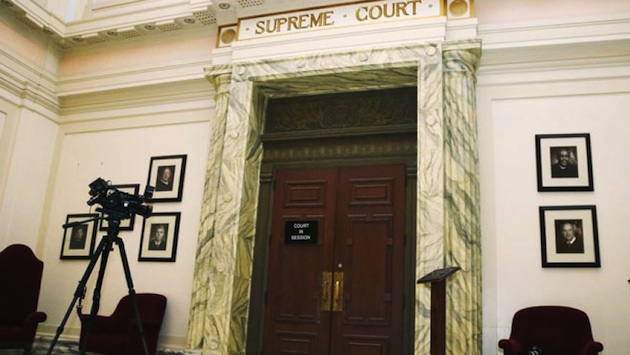

July 15, 2014: The Oklahoma Supreme Court meets for a hearing closed to cameras in Oklahoma City. (Photo: AP)
The Oklahoma Supreme Court ruled Tuesday that the state legislature has authority to repeal Common Core English and math standards in the state’s public schools. The ruling has emboldened opponents of the law in and out of state governments across the nation, and is the latest victory in the movement to dismantle the centralized education program in a battle most admit opponents of the law are winning.
Other states that have either repealed or formally withdrawn from Common Core standards, including Indiana and South Carolina. The bill repealing Common Core standards for English and math did not include standards for science and social studies. It also mandated the board to revert to educational standards in place before June 2010, but required them to develop new state educational standards by 2016.
It took the state’s highest court just over four hours to decide the ruling after attorneys presented oral arguments in a lawsuit that challenged the repeal, claiming lawmakers violated the state Board of Education’s constitutional authority over the “supervision of instruction in the public schools” when they repealed Common Core standards earlier this year.
But, in an 8-1 decision, the Oklahoma Supreme Court disagreed, ruling the state legislature’s action was not unconstitutional.
Attorney Robert McCampbell, who represents parents, teachers and four members of the seven-member Oklahoma Board of Education in the lawsuit, said he was “disappointed with the result” but respected the court’s decision. McCampbell said he was not surprised the court ruled so quickly. The case was argued just a month before public school students across the state are set to return to classrooms, and the standards were scheduled to go into effect in this upcoming year.
“We had asked for it to be placed on the expedited docket and they granted that request,” he said.
House Speaker Jeff Hickman, R-Fairview, was clearly happy with the decision.
“I look forward to the adoption of new standards for education in Oklahoma which will challenge our students and prepare them for the future,” Hickman said.
During oral arguments, McCampbell argued that the power of the state legislature was subservient to the Board of Education, essentially. He argued the repeal of Common Core was unconstitutional and represented and “unprecedented expansion” of its powers.
“Supervision of instruction is vested in the Board of Education,” McCampbell argued.
Solicitor General Patrick Wyrick argued that the state legislature, which in 2010 instructed the board to adopt Common Core instructional standards also adopted by more than 40 other states, has supreme authority to pass laws and that public school education standards are subject to legislative review.
“This court has always held that rule-making is a legislative function,” Wyrick said.
Gov. Mary Fallin signed into law legislation repealing the standards last month, but McCampbell said the Board of Education, not lawmakers, should decide what math problems are taught in public schools and whether the Gettysburg Address should be taught in the 10th grade or the 11th grade, he said.
“They are reaching into the classroom,” McCampbell said. “That’s supervision of instruction in the public schools.”
But parents and teachers who were present for the oral arguments expressed support for repeal of the Common Core standards, and, polling data across the nation, mirrors their expressions.
Nikki Fate, who attended the hearing with her 7- and 9-year-old daughters, said she believes Common Core standards are developmentally inappropriate.
“It is cognitive abuse on our children,” Fate said.
In April, PPD examined support for Common Core standards among parents with children in public schools and found those who reported they were familiar with the standards opposed them. The results led PPD to conclude that the more parents learned about the standards, the more opposed to Common Core they would become. Sure enough, the latest data show support has fallen even further, with no sign of a reversal in the trend.




